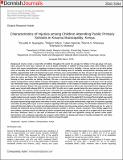Characteristics of injuries among children attending public primary schools in Kisumu Municipality, Kenya.
Publication Date
2015-05-18Author
Drusilla N Nyangahu, Wilson Odero, Lilian Ogonda, Morris Shisanya Senghor, Everlyne Nyanchera Morema
Metadata
Show full item recordAbstract/
: Injuries remain a major killer of children throughout the world. On average, for children in the age group 5-14 years,
injury accounts for more than a quarter (27 %) of all deaths worldwide. In addition to these deaths, many other children sustain
injuries that require hospitalization, outpatient treatment and sometimes result in disability. In Kenya, injuries are the third leading
cause of mortality after malaria and HIV/AIDS and are the fifth leading cause of morbidity among patients attending health care
facilities. Approximately 16.8 % of reported injury cases in Kisumu occur among children less than 15 years of age and accounting for
28.7 % of the total injury admissions. Although children less than 15 years of age fall within the primary school age, not much is known
about the nature and factors that contribute to the occurrence of injuries among primary school children in Kisumu and programs
focusing on their prevention are lacking. Methods: This was a cross-sectional study that aimed to describe the characteristics of
injuries among primary school children in Kisumu Municipality. A random sample of 492 pupils aged 11 to 18 years; from 18 schools
was interviewed using a structured questionnaire to collect information on the incidence of injuries during the three month period
prior to the interview. Results: The most common cause of these injuries was due to falls on the same level (33.9 %). Majority of these
pupils were injured while playing (48.8 %), at home (40.9 %) with cuts or open wounds being the most common injury that was
sustained (42.1 %). However, injuries caused by fire / hot fluids were associated with gender (P < 0.002) with 76% of the pupils who
reported having sustained these injuries being girls. Furthermore, gender was associated with occurrences of injuries at home (P <
0.001) with 115 out of the 201 (57.2%) children who reported having been injured while at home being girls. Almost half of the pupils
sought medical care and a quarter of the pupils were hospitalized. Two-thirds of the pupils (66.5 %) received first aid which was mostly
administered by a friend or family. More than half (56.7 %) of the pupils were absent from school due to the injury. Although 95.7 % of
the pupils reported being taught about road safety in school, only 24 % of the pupils demonstrated a high level of awareness regarding
road safety by being able to give a correct response regarding traffic lights and zebra crossing. The information obtained from this
study will shed more light on the extent and characteristics of injuries occurring among primary school children and can be used to
develop and implement injury prevention and safety promotion policies in primary schools. Conclusion: These findings suggest that
most children in primary schools are affected by injuries sustained while playing at home; and girls are at a higher risk of burn injuries
than boys. Moreover, there is a low level of awareness of road safety rules and regulations among the primary school pupils.
Interventions such as adequate supervision by caregivers while children are playing and review of teaching strategies for road safety
education for schools could aid in the reduction of injuries among the pupils.

